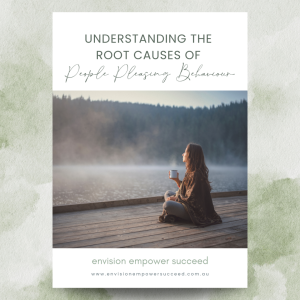People-pleasing may feel like a natural way to maintain harmony and connection, but it often comes at a cost—your own well-being, boundaries, and sense of self. While the tendency to please others can stem from deep-seated fears and patterns, the good news is that it’s possible to unlearn these behaviours and build healthier, more balanced relationships.
If you’re a people-pleaser looking to change, or you know someone struggling with this behaviour, here’s a step-by-step guide to fix people-pleasing and create a more authentic, empowered life.
1. Recognise the Signs
The first step to fixing people-pleasing is acknowledging the behaviour. Common signs include:
- Struggling to say “no” even when you’re overwhelmed.
- Suppressing your opinions or needs to avoid conflict.
- Seeking constant validation or approval from others.
- Feeling guilty or anxious when you prioritise yourself.
Awareness is key—it allows you to identify the moments when you’re acting out of a need to please rather than staying true to yourself.
2. Understand the Root Cause
People-pleasing often has deep emotional roots, such as:
- Fear of rejection or abandonment.
- Low self-esteem or self-worth.
- Childhood conditioning or trauma.
Take time to reflect on where your need to please comes from. Journaling or working with a therapist or coach can help you uncover the underlying causes and patterns driving your behaviour.
3. Reframe Your Beliefs
People-pleasers often carry limiting beliefs, such as:
- “I need to keep everyone happy to be liked.”
- “If I say no, people will think I’m selfish.”
- “My value comes from what I do for others.”
Challenge these beliefs and replace them with healthier ones, such as:
- “I deserve to prioritise my needs.”
- “Setting boundaries is an act of self-respect.”
- “My worth is not determined by how much I give.”
Reframing your mindset takes practice, but it’s essential for breaking free from people-pleasing.
4. Learn to Set Boundaries
Setting boundaries is one of the most effective ways to stop people-pleasing. Start small:
- Practice saying “no” to minor requests that don’t align with your priorities.
- Use phrases like, “Let me check my schedule and get back to you,” to give yourself time to decide.
- Remember that setting boundaries isn’t about being rude; it’s about protecting your energy and time.
As you build confidence, you’ll find it easier to assert your needs in more significant situations.
5. Prioritise Self-Care
People-pleasers often neglect their own needs, but self-care is crucial for breaking the cycle. Make time for activities that nourish your body, mind, and soul, such as:
- Exercise, meditation, or journaling.
- Pursuing hobbies or passions that bring you joy.
- Resting and recharging without guilt.
When you prioritise yourself, you’ll feel more balanced and better equipped to show up authentically in your relationships.
6. Practice Assertive Communication
Being assertive doesn’t mean being aggressive; it means expressing your needs and boundaries clearly and respectfully. Tips for assertive communication include:
- Using “I” statements, such as “I feel overwhelmed when I take on too many tasks.”
- Keeping your tone calm and confident.
- Practising responses in advance for situations where you typically people-please.
Assertiveness is a skill that takes time to develop, but it’s an essential tool for breaking free from people-pleasing.
7. Build Your Confidence
People-pleasing often stems from a lack of self-confidence. To build your confidence:
- Celebrate your strengths and achievements, no matter how small.
- Surround yourself with supportive people who respect your boundaries.
- Focus on your personal growth and self-improvement.
The more you value yourself, the less you’ll feel the need to seek validation from others.
8. Embrace Discomfort
Breaking free from people-pleasing can feel uncomfortable, especially if you’ve been doing it for years. You might worry about disappointing others or facing conflict. Remember:
- It’s okay if some people don’t agree with your choices.
- True relationships will respect your boundaries and support your growth.
- Discomfort is a natural part of change and growth.
Lean into the discomfort, knowing that it’s a sign you’re stepping into your power.
9. Seek Professional Support
Sometimes, breaking free from people-pleasing requires guidance from a professional. A therapist or coach can:
- Help you identify and heal the root causes of your behaviour.
- Provide tools and strategies to build confidence and set boundaries.
- Support you in navigating challenges and setbacks along the way.
Investing in professional support can make the process smoother and more effective.
10. Celebrate Your Progress
Every step you take toward breaking free from people-pleasing is worth celebrating. Acknowledge your wins, such as:
- Saying “no” for the first time without guilt.
- Taking time for yourself without feeling selfish.
- Expressing your needs confidently in a conversation.
These small victories add up and reinforce your commitment to prioritising yourself.
People-pleasing doesn’t have to define you. By recognising the behaviour, understanding its roots, and taking intentional steps to change, you can create a life that feels more aligned, authentic, and fulfilling. Fixing people-pleasing isn’t about becoming selfish; it’s about honouring your needs and building healthier, more balanced relationships.








